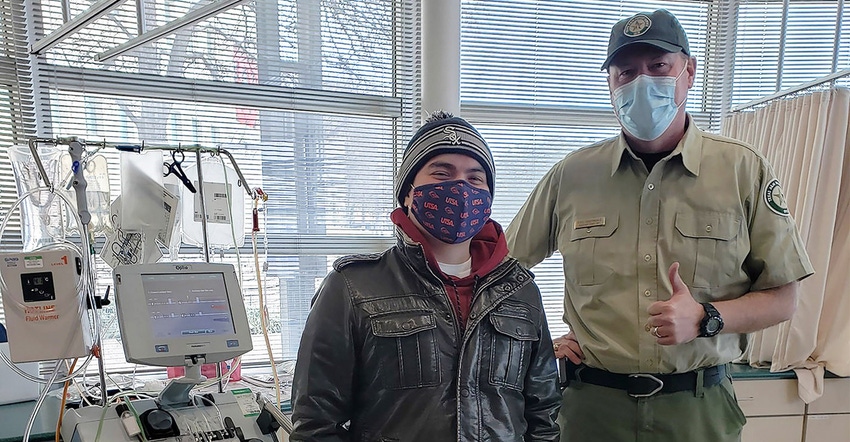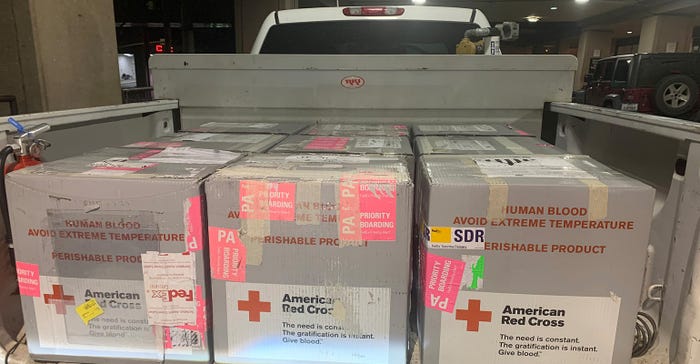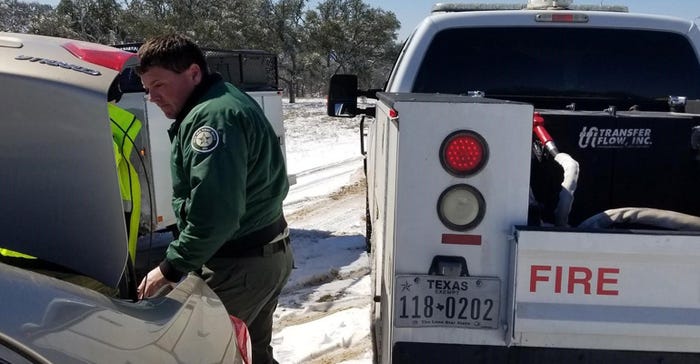April 14, 2021

When Winter Storm Uri swept through Texas in February, the Texas A&M Forest Service mobilized all available equipment and personnel statewide to aid in the emergency response.
Typically TFS personnel assists with road clearing, checking on stranded motorists, food and water distribution, as well as shelter management and support. But Uri would summon the agency's men and women to respond in even more heroic ways.
Stranded at the San Antonio International Airport, bone marrow donor Rodolfo Aguilar was unable to complete his journey to donate lifesaving cells. He had been matched with a young child who was critically ill with cancer, but the timing of the donation was essential for the most successful outcome. Aguilar needed to be in San Antonio on Feb. 16 to donate bone marrow cells, but road conditions made it too dangerous for him to make the 150-mile drive.
Flown to the airport by private helicopter, Aguilar arrived in a city that was essentially shut down. Todd Nightingale, Texas A&M Forest Service assistant chief regional fire coordinator in San Antonio, was assigned to transport Aguilar in a four-wheel drive vehicle from the airport to the GenCure Texas Blood Bank in downtown San Antonio. The normally 15-minute trip to the airport took him more than an hour, crossing roads that were closed and driving on snow and ice.
See, Texas cotton growers discuss soil health, management practices
“It was the most important 4×4 chauffeur mission I have been a part of,” Nightingale said. “I was the last leg in a lot of coordination throughout the state, and I was humbled to be involved.”
Nightingale coordinated with airport personnel and a nurse at the blood bank about the best routes to follow. Then, in frequent contact with the nurse to keep her informed of their progress, he and Aguilar made the harrowing journey downtown.
“There was a lot of intelligence gathering before we went,” Nightingale said. “We were able to get there from the airport in about 40 minutes. It took me about 2 hours to get back to my home base. That’s how much difference going one way or another made because of traffic, accidents and closed roads.”
Nightingale’s role was critical to the overall mission, according to CEO Amy Ronneberg, Be The Match.
“Quite frankly, without his help, we would not have been able to make this transport happen,” Ronneberg said. “Given that our work is about saving lives, there was a life on the other end. This happened to be an international patient who would not have received their lifesaving cells, otherwise.”
“I’m glad something good came out of what was a tough event for so many people,” Nightingale said. “We help with wellness checks, caring for people in communities, delivering fuel and all kinds of other responses. Every mission is important. It’s an interesting, challenging and rewarding job.”
Lifesaving delivery
After spending the day delivering blankets and water to Fort Worth residents who had no electricity, Boe Adler, Texas A&M Forest Service task force coordinator, returned to his home base in Mineral Wells. He then received a high-priority request to deliver donated blood from the American Red Cross in Dallas to the Houston Methodist Hospital and the Texas Gulf Coast Region American Red Cross.
With no deliveries in about five days, the hospital’s blood supply was at critical levels. Backup plans for replenishing it were compromised by the statewide weather and power outages. The Coast Guard could not fly the blood to Houston, so the Texas A&M Forest Service accepted the mission to deliver the blood via a four-wheel-drive vehicle.

Adler and Abigail Zeman, Texas A&M Forest Service resource specialist, Mineral Wells, drove from Mineral Wells to Dallas, picked up 20 boxes of blood at 10:30 p.m. and continued on to Houston over snow and ice-covered roads.
“It was surreal to think about what we were hauling,” Adler said. “We were transporting lifesaving material in below-freezing conditions across most of the length of the state to assist people.”
Adler and Zeman delivered the blood the Houston Methodist Hospital needed and then took the leftover supply to the hospital services unit of the American Red Cross, completing their mission at 3:15 a.m. They returned immediately to Mineral Wells to prepare the equipment their team would need for requests for assistance in Fort Worth that day.
Charles Blake, division disaster executive for the Southwest and Rocky Mountain Division of the American Red Cross, said that the hospital and blood bank received the blood in the nick of time.
“I’m almost sure they saved some lives that night by getting that blood to where it was needed,” Blake said. “They did an extraordinary humanitarian mission on our behalf.”
“It’s part of what we’re here to do,” Adler said. “We try to figure out a way to say ‘Yes’ and help people in their time of need.”
Never forget
While Winter Storm Uri affected the entire state, it hit Gillespie County hard. The power went out on Feb. 11, and some residents would be without it for more than 20 days. Roads were icy and snowed-in; people in rural areas were stuck at home. No power meant that there was also no running water for some residents, and grocery stores and gas stations were running out of food and fuel.
Cell signals were limited because the cell phone towers were out of service. Three radio towers also lost service when the cell phone system went down, limiting emergency responders to one channel on their two-way radio system.

Randall Fuchs, Texas A&M Forest Service task force coordinator in Fredericksburg, and Drew Liddell, Texas A&M Forest Service lead resource specialist in Fredericksburg, were part of a team of five of the agency’s employees who, over three days, responded in the field to 183 calls for assistance.
“We did a little bit of everything to alleviate some of the burden on the local responders as much as possible,” Fuchs said.
They transported motorists stranded on rural roads to shelters; cleared debris for people blocked in their homes; helped a small community get their frozen water system running; performed welfare checks; and provided drinking water, MREs or meals-ready-to-eat, firewood and fuel for cars and generators.
Gillespie County resident Sharon Ogletree prepared for the storm, but after several days, she knew she needed help. With no power, there was no water from her well. She ran out of firewood and spent the night without heat. Having used her car for heat and recharging her cell phone, she was almost out of gas. When her call to the emergency dispatch number came in, Fuchs and Liddell took the assignment.
“It wasn’t long at all, maybe an hour, and here comes the Texas A&M Forest Service,” Ogletree said. “They saved me! I was so, so grateful because of what I’d been through. I will never forget what they did for me that day.”
Fuchs and Liddell filled her car with gas, provided her with drinking water and MREs, and cut up and stacked the downed limbs on her property for firewood. The supplies they left sustained her until power and water were restored on Feb. 20.
“She had a rough couple of days, and I’m glad we were able to make it better for her,” Liddell said. “That’s why we do this job. Many people know we are wildland firefighters, but as incident response personnel, we specialize in being ready to respond to any state of emergency as requested. We’re here to serve the public and make sure they’re taken care of.”
Throughout Winter Storm Uri, the Texas A&M Forest Service provided 196 responders to state and local requests; cleared 3,359 miles of interstate and state highways; patrolled 10,640 miles of highway in four-wheel-drive vehicles; assisted 681 motorists and towed 78 commercial trucks; transported 52 individuals to shelters or warming stations; conducted 89 welfare checks on homebound families; and delivered 2.7 million meals, 37,000 blankets, as well as 18 million bottles and 4,700 gallon-size jugs of water.
Source: is AgriLife TODAY, which is solely responsible for the information provided and is wholly owned by the source. Informa Business Media and all its subsidiaries are not responsible for any of the content contained in this information asset.
Read more about:
Winter Storm UriYou May Also Like




